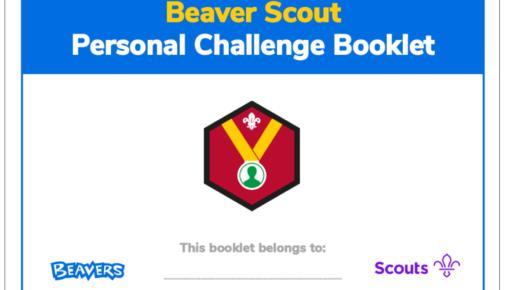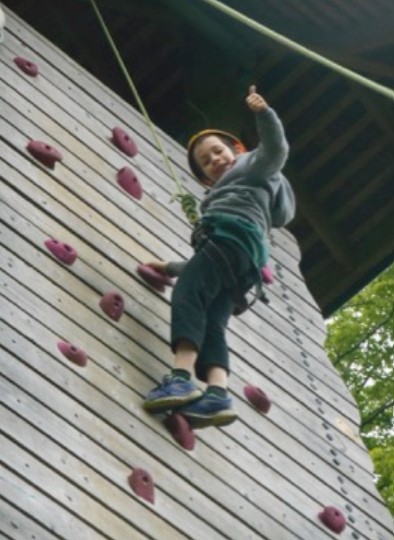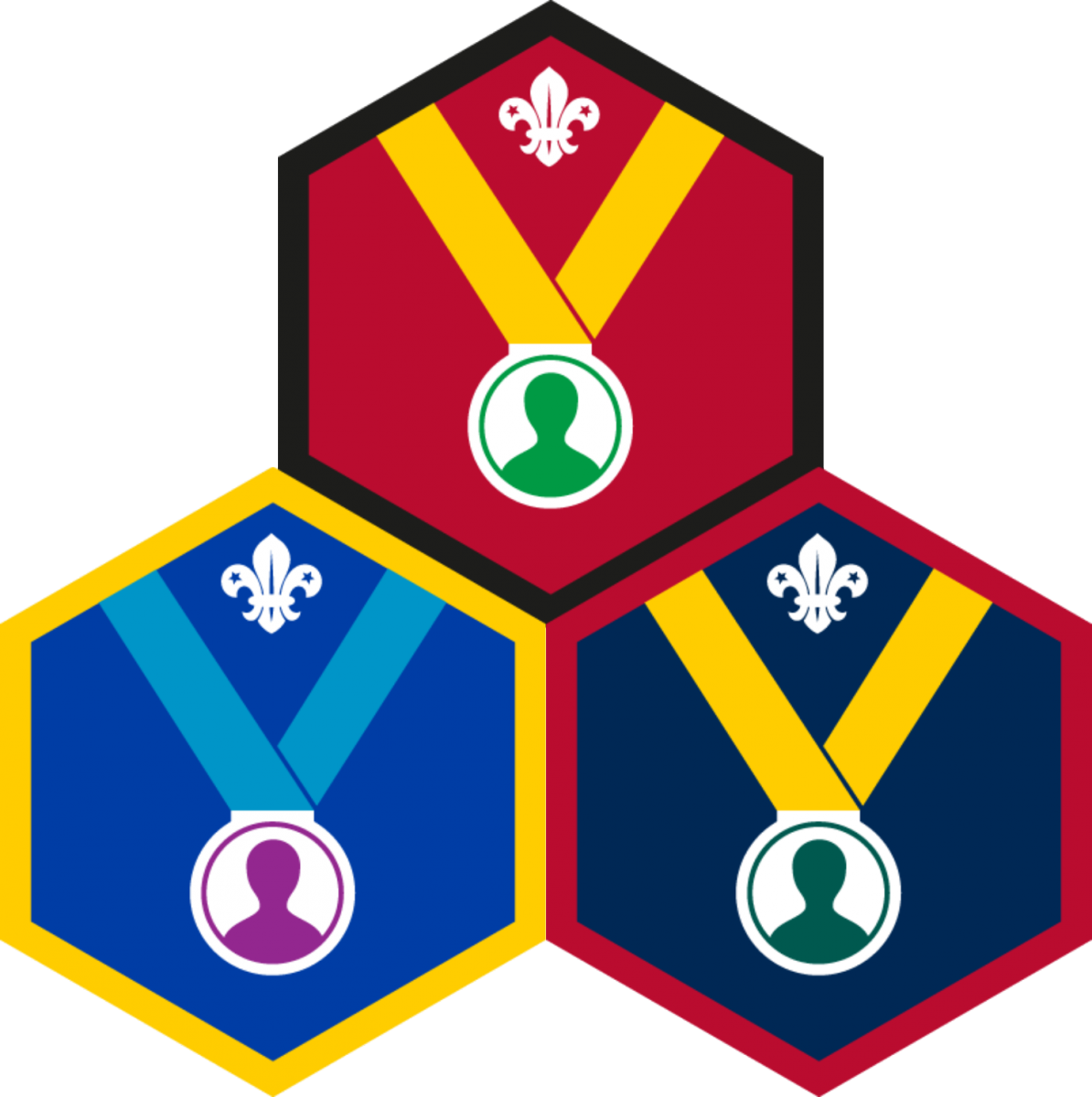Getting personal: The Personal Challenge Award
The Personal Challenge Award encourages young people to reach their full potential. For leaders who find supporting this particular badge a little tricky, here are some tips from across the Movement.
The Personal Challenge Award is a way for young people to tackle something that’s holding them back or stifling their growth. Whether it’s avoiding practising for a music exam, learning how to swim, or speaking in public, we all have hurdles to overcome.
The things we fear prevent us from reaching our full potential, which is the very opposite of Scouting’s purpose.
With the Personal Challenge Award you can support young people to overcome a challenge they’re struggling with. As the award requires the young person to overcome two challenges – one they have set and another a leader sets for them – the badge is a perfect opportunity to learn more about the young people in your section as individuals. By chatting to them about what they’d like to improve, you’ll be in a better position to empathise with their struggles and share in the joy of achievement as they overcome them.
How do young people earn the award?
Young people must complete two personal challenges, agreed with their leader. The challenges should be things they find difficult but that they can overcome with commitment.
The challenges can relate to any part of the young person’s life – home, sports, school or scouts – but they must be challenges that are personal to them, so that young people can take full ownership.
Overcoming challenges can change lives
The Personal Challenge Award is positively challenging and is helping young people grow across the Movement. One mum, Jenny Davis, said her 10-year-old Cub ‘does the remembrance parade every year but doesn’t stay. This year, his challenge was to stay throughout the wreath laying and speeches.’ She explains that because ‘he has ADHD, this is extremely challenging for him.’
To help you support your young people to achieve their award, here’s some useful guidance from other leaders – from useful methods to inspiring examples.
Tips and ideas
- Timing counts. Encourage young people to tackle the award once they’re settled into the section and you’ve got to know them a bit better, to give you both a chance to identify what to work on.
- Use positive phrasing. Instead of asking what they’re good at or not good at, you could ask what they can improve on or what they’d like to get better at. After all, the challenge is not only about developing new skills but also furthering skills they already have.
- Encourage them ‘to think of something that will really change their lives and set them a time scale to plan and achieve,’ as scout leader, Matt Austin suggests. This year, his section was challenged to support the charity Candle lighters, working with mental health charity Mind.
- Although the Personal Challenge Award is about young people choosing a challenge for themselves, younger sections might benefit from some parental input. Rachel Betteridge says they ask parents about ‘things that may benefit at home or things they would like their children to develop.’ This input should come out of a discussion between the parents/ carers and their children. Dialogue with the young person is key.
- Link their challenge to their Promise and make a good-deed jar each, as Beaver Leader Sara Price suggests. They could ‘take their jar home and try to do something kind, helpful or do their best every day and each time put a pasta shape or something similar and see how it fills up over the next few weeks.’
- Rachel Cook was inspired by SMART plans in supporting her Cubs to come up with their challenges, getting them to think of something both achievable and realistic.
Here are some great examples:
- At a section meeting, set up activity bases that are linked to different badges, one of these focusing on the Personal Challenge.
- In groups of up to six, ask the young people to rotate around these bases. The Personal Challenge base should feature pictures of example challenges to inspire young people to come up with a challenge of their own.
- Discuss the importance of challenges with the young people, e.g. how they feel when they overcome a challenge.
- Discuss how to make those challenges achievable and meaningful. For instance, she said that one Beaver wanted to be a superhero, so they discussed the qualities of a superhero, e.g. being kind – and so, they agreed on a challenge based on that.
- Chart everyone’s challenges on a spreadsheet to keep track.
Challenge ideas from leaders
- Build a dustbin oven as part of their Scouts Team Leader Challenge Award
- Refurbish a bike
- Help at Beavers
- Do homework when it’s set, rather than when it is due
- Devise and monitor a cat-feeding rota
- Give up video gaming for a month to play outside more
- Try a rollercoaster for the first time
- Try a sleepover
- Sleep in a hammock for a night
- Complete seven acts of random kindness within seven weeks
Memory & Organisation
- Organise a small fundraising event for the group or local charity.
- Keep your bedroom tidy for a minimum of a month.
- Be responsible for packing/unpacking equipment from the QM store for 3 camps.
- Be responsible for recording the register at Scouts for a term.
- Successfully grow a plant from seed
- Take your dog for a walk every day for two weeks, even if it’s raining
- Take home a stuffed toy and remember to bring it to scouts every week for a term
- Learn and Recite the NATO phonetic alphabet.
- Find out an interesting fact to tell the Scout troop every week for a term
- Learn a topic and to tell a different scout every week what they have learnt and remembered about that chosen topic – (Submitted by 3rd Bristol)
- Research about another scout troop near or far – Find out their history, what activities they enjoy and some similarities and differences.
- Organise a 5-a-side football tournament.
- Create a guide book of local attractions which could be given to visitors.
- Organise and run a treasure hunt using codes as clues.
- Organise cards for upcoming birthdays in the scout group. Then get everyone to sign the cards.
Resilience
- Make a commitment to improve something you already do such as playing a musical instrument.
- Take part in a school performance – and invite the scouts!
- Reach a target grade in a school subject you find hard.
- Make a commitment to try a new activity and follow it up with a talk back to the troop
- Overcome a fear of phobia
- Earn a spot on a sports team for a term
- Achieve 100% attendance at scouts or school for a whole term.
- Complete a Responsible Pet Ownership Programme (Eg: Kennel Club, Blue Cross)
- Complete the Rookie Lifeguard Programme
- Create a project using the BBC microbit -Here's an idea
- Show perseverance by attending regular revision lessons for a subject you find hard at school.
- Learn some basic phrases in a foreign language which is new to you. Follow up by teaching it back to the troop.
- Set up a recycling program at the Scout HQ, home or school.
- Sign up and take part in a half term sports tournament.
- Attend rehearsals for a school play or something similar over at least a term
- Enter the Sun Flower Challengeand record its growth.
- Build and programme a DIY robot such as the M-Bot.
- Achieve a beginner's radio transmitting licence.
- Organise and take part in a sponsored walk.
- Complete a basic First Aid Course
- Learn to Kayak and complete your Paddlesport Passport.
- Undertake a successful grading exam in a martial art
- Overcome handwriting difficulties.
- Complete a continuous one hour run for charity.
Initiative
- Learn a new skill and demonstrate it to the troop
- Make a commitment to volunteer for an event
- Try something new that you have put off trying before
- Take your dog for a walk every day for two weeks, even if it’s raining
- Help clear up after a scout event
- Create a memory game to help students remember key facts about a topic
- Create a poster publicising the work of a chosen charity, or charitable initiative, such as Sport Relief
- Create a recipe book with your peers to introduce people to healthy cooking
- Create a resource for a sport, activity or game you do at Scouts, including the rules and scoring systems
- Create a traditional meal from a country of your choice and share it with your peers to encourage them to learn more about the country
- Create an anti-bullying campaign for your troop, including a video to be shown to others when they join.
- Create and design a set of Christmas cards that can be sold at a Christmas fair with any profit being donated to charity.
- Create and develop a personal fitness plan including top tips for leading a healthy lifestyle
- Create and promote a road safety campaign in your Scout Group. Visit your Beaver and Cub sections to show them how to keep safe.
- Sign up and take part in a Makaton Course to learn Sign Language
- Participate in a gardening project to improve the grounds at your HQ
- Set up a new business with only £30 and make a profit.
- Visit a museum /art gallery with your family, and share your experiences with peers afterwards
- Set up a new business with only £10 and make a profit (as part of the Tenner.org.ukcompetition)
- Volunteer to assist a younger sibling with a number of school projects over the course of a term, and present back to your class about what you learnt.
- Volunteer to be involved in a community fair/carnival/celebration
- Volunteer to come into scouts or your school early on a regular basis to help a teacher set up for the day
- Volunteer to help Cubs when they visit on Induction Day
- Volunteer to lead a food collection for charity
- Volunteer with the elderly at a care home
- Volunteer to do litter picking with a small group in the community
- Volunteer to go shopping for a senior citizen in the community
- Train your dog and then enter your dog in a local dog show
- Volunteer to regularly mow the lawn of an elderly or disabled friend or relative
Being helpful
- Take part in a local litterpick in your community.
- Invite a friend from school to try Scouts.
- Take a neighbours dog for a walk on a regular basis.
- Help an elderly member of your family with their chores or shopping.
- Put on a bake-sale to raise funds for the troop.
- Run a stall at a school fayre.
- Fundraise some money to pay for a camp. How about baking some cookies and selling them to your neighbours?
- Take your dog for a walk every day for two weeks, even if it’s raining.
- Take on extra chores at home and complete them every week for at least a month.
Communication
- Contribute an article to the district website/newsletter
- Perform in a scout or school production
- Bring in 3 interesting objects from the forest and tell the troop about them.
- Produce a short film outlining the importance of road safety (or other topic)
- Design a guide to the library for new students
- Design a new noticeboard for Advanced EAL pupils.
- Design a healthy and varied menu for a family of four to a set budget
- Design a case study of a local place of geographical interest
- Design a poster in your taught language to advertise your current topic of study
- Design a wall display using the photos taken from a school field trip
- Assist in the organisation of a sports tournament, taking on a specific role
- Organise a Clean for the Queen litter pick in your town or village
- Organise a collection for charity in which donations are collected from members of the public then sent to the charity as part of a larger fundraising event
- Organise a competition for your class to carry out
- Organise a Shoe box appeal in your class/form
- Organise for birthday bunting for every student's birthday in your form, for a term
- Organise and run a stall at a school summer/winter fair
- Conduct a demonstration on how to use a piece of classroom equipment safely in a DT or Science lesson
- Compile the register monitor rota
- Compile a series of entries for the year group's joke book
- Organise the collection of data from the school's weather station
- Organise the care of a neighbour's garden and dustbins while they are away
- Organise the teams and order of play for an inter-house/nter-form sports competition/sports day
- Create an online blog to showcase your work and the work of your peers in Art
- Volunteer to help someone in your community with their garden or allotment
Cooking
- Cook a 3 course meal at home for your family.
- Successfully lead a whole day of cooking on camp.
- Cook a pudding at home to share with the whole troop.
- Bake some cookies and sell them to your neighbours to raise some money.
Physical activities & Sport
- Coach our sports team at a district competition
- Take part in your local ParkRun for a month (or other 5km run).
- Join a School sports club.
- Improve your swimming. Set a goal and beat it.
Creative
- Create a model using a kit and show it to the group.
- Paint a picture.
- Write a song
- Make a set of survival bracelets for your six, patrol
- Enter a national design or creative competition e.g. National Geographic Design Competition
Leadership
- Help a new Scout complete their welcome pack
- Talk about a topic you are interested in in front of the troop
- Coach our sports team at a district competition
- Lead a series of activities at Scout meeting or on a camp.
- Conduct a survey about outdoor interests, analyse the results and present it back to your troop
- Deliver a presentation at a Primary School about an area of interest
- Be reading mentor for a younger sibling or student in school for at least a term
- Lead a weekly News Quiz at flag break, for a term
- Lead a group well-being session e.g. a yoga session
- Take responsibility for refereeing a sports match
Behaviour
- Make a commitment to improve your behaviour at School, Home and Scouts. After 1 month provide a written statement from a teacher, parent and leader
More
- Learn how to tell the time using an analog clock – So many kids don’t know this!
- Learn to tie your shoelaces
Carol Blyth says her son was nine when he joined swimming club and his challenge was to swim in a competition and dive off the blocks: ‘It took him nearly six months to achieve but he was delighted when he did it!’
Anna Whitt says her son had to keep his bedroom tidy for three months for his leader challenge, while he chose to cycle the length of the South Downs Way for his own. ‘He found the first part a lot harder than the second,’ she says.
Assistant cub scout leader, Anne Addison said their Cub Pack took part in the Save the Children (STC), National Den Day. She explains that ‘they spent the evening building their dens and then the challenge was to sleep out in them.’ According to Anne they loved it, and they raised quite a bit for STC as well.

Mossy resources
It can sometimes be difficult to explain the challenge to both the young person and their parent(s) and keeping track of their progress over a number of weeks. To help with this Mossy (an assistant beaver scout leader. from Derby), has designed a Personal Challenge Booklet (for each section), which are designed to give an overview of what the young person needs to do, and provide a space to record what they’ve done.
The booklet could be worked through during weekly meetings, or could be completed at home. The booklets are available with two separate goal lengths and are available (4 weeks and 6-8 weeks) allowing the challenge to be adapted to suit the ability of the young person.

